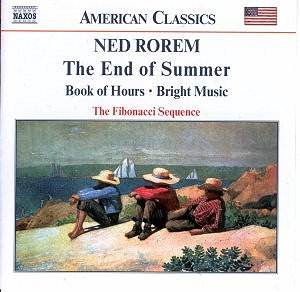Rorem has always seemed to me something of a hothouse
plant musically speaking - echoed in more recent times by the music
of Aaron J Kernis. I was instantly drawn to Rorem in 1971 by his orchestral
piece Lions (still an outstanding piece of surreal impressionism
caught up in upheaval) and later by his Eagles, Sun, Sky
Music and Sunday Morning - pieces with marginally less sensuous
parallels with the single movement orchestral ‘scenas’ by William Mathias
(Vistas, Laudi, Helios). His Third Symphony (recorded
on Turnabout) made for more opaque going and still strikes me as a problematic
piece. His first two symphonies are more approachable. Since then his
songs have been favoured by the big companies amongst which I must include
Naxos.
This valuable collection of his chamber music is of
comparatively recent vintage. End of Summer is a phantasmagoria
of a piece with two outer movements projecting a hail of Paganinian
brands and sparks, flurries of molten shards and flame. The music at
white heat bears resemblances to the scorching virtuosity of the William
Schuman Violin Concerto. This is music touched with but not subdued
by the avant-garde school. As if to prove it the central movement and
the heart of the Mazurka finale is smoothly lyrical - Barber by way
of Finzi; Bax by way of Howells, Alwyn by way of Delius. Certainly if
you like the clarinet sonatas of John Ireland, William Alwyn and Arnold
Bax there is much that you will like here. Disconcertingly but not disagreeably
there seems to be woven into this music elements of Chopin and Mozart.
Back ten years and in Book of Hours Rorem is to be found
closer to the refractory mill of the then modernity. Even so
he keeps in intimate touch with the lyrical lode and the ‘high midsummer
pomps’. Despite the monastic titles for the movements (Matins,
Lauds, Vespers, Compline etc) the music tends towards
Gallic sensuality, passerine song and unbridled display rather than
spiritual abnegation. The eight movements are as short as 0.40 or as
long as 4.04. Even across so much potential for fragmentation the piece
retains a mood-coherent warmth and lambency. Bright Music
is a suite for flute, two violins, cello and piano. The piece is
in five movements: a waspish virtuosic fury of a Fandango interrupted
by a heurigen-melodie of a song, a warmly washing pavane-like Pierrot
and Another Dream, a desperate perpetuum mobile of Dance-Song-Dance
and the similarly furious finale called simply Chopin. Rorem’s
stays in Paris, Morocco and again in Paris from 1949 to 1957 left him
with a fluency in the French language as well as the qualities we ikonically
associate with the French (or I should say Parisian) influence: fastidious
elegance and lucidity of expression.
Production values are high and consistently so across
performances, recording quality and documentation. Those who love the
Ravel Introduction and Allegro, the Ropartz triptych and Baxs’
Nonet should lose no time in tracking down this disc. Expect
those voices to be moderated by the warmth of Samuel Barber (Summer
Music and Knoxville) but ruffled from time to time (not half
as often as you might expect) by the searing cinders of William Schuman.
Go for it!
Rob Barnett

